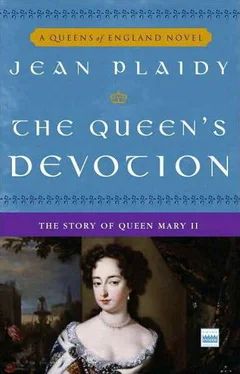I was exasperated when I read this letter, and, as William had said that if Lady Marlborough did not leave the Cockpit then Anne herself could not stay there, the task fell to me to tell her to depart.
Anne prepared then to leave and fortunately the Duchess of Somerset offered to lend her Sion House.
Little William was staying at Kensington at the time, which gave me great pleasure, but Anne ordered that her son leave Kensington at once and accompany her to Sion House. I was desolate and William was really angry. He sent a command to Sion House demanding that Lady Marlborough leave without delay.
Anne’s obstinacy came into play. She would not give up Sarah. William was in a quandry. What could he do? Send guards to Sion House? Remove Sarah by force? How would Anne react to that? We all knew her stubborn nature, and with Sarah beside her, what mad act would she be capable of?
The people liked Anne. They loved the little Duke of Gloucester. Poor Anne, they would say. She cannot have whom she likes to attend her. The Dutchman must even decide on her servants. It could be a dangerous situation.
So it was allowed to pass, and Sarah stayed with Anne at Sion House.
The mystery of what was called the flowerpot plot was solved without much difficulty. It proved to be preposterous and even more farcical than Titus Oates’s popish plot.
The perpetrator, Robert Young, had modeled himself on the famous Oates. He was, when it started, in Newgate Jail on a charge of bigamy. He called himself a priest and had documents to prove it, but Robert Young had no difficulty in providing documents to prove anything, because he was an expert forger.
Therefore, to produce the incriminating evidence against some of the most important people in the country, all of whom could be suspected of antagonism toward William, presented no difficulty to him at all. It was fairly easy for him to see signatures of these men, and all he had to do was study them for a while and produce replicas.
He wrote the document, but it had to be found before it could be of any use.
Stephen Blackhead was a fellow prisoner with a grievance against the State. He had been set in the pillory and badly treated, for he had lost one of his ears. He wanted revenge — no matter on whom — on someone rich and famous, someone who had everything while he, poor Blackhead, had nothing.
He was a simpleton, Young knew, but he was all he could get. Blackhead had served his time and was at liberty. Therefore he could work for Robert Young, who could promise him rewards for his labor such as the poor man had never had before.
It was quite simple. All Blackhead had to do was to take a letter to the house of the Bishop of Rochester in Bromley. He had had instructions, he would say, to deliver it into the hands of the Bishop and no other. Young would also give him another paper which he must hide on his person and show to no one. If he did, there would be no money for him — only trouble. Everything depended on his doing exactly what Robert Young told him.
He would be put into a waiting room when he arrived and would certainly not be taken to the Bishop immediately. He must look around. The Bishop was noted for his interest in plants and there would be a great many of them in pots around his house.
While he was in the Bishop’s residence, Blackhead must find some means of slipping the document into a flowerpot, making sure that it was well hidden. Then he would hand the letter to the Bishop and depart.
Blackhead was not very bright, but he did need the money badly, and Robert Young had hinted that this action of theirs would bring disgrace to some very highly placed people — and that appealed to him.
Strangely enough, up to a point the plot succeeded. The letter to the Bishop — written of course in Young’s expert hand — was reputed to be from some nonexistent deacon of a faraway parish, and served its purpose, for the Bishop must have received many such letters — most of them left unanswered; and being left in a room which contained numerous flowerpots, Blackhead had no difficulty in disposing of the document.
When Young received word that it was safely in the Bishop’s house, it was time to act.
He disclosed the fact that he had heard that there was a plot to assassinate the King and Queen and set James on the throne. He announced that the Bishop of Rochester was involved and that in his house they would find the incriminating document, signed by all the conspirators.
The search was made and nothing found, but Robert Young said he was certain the paper was there and he was given permission to join the searchers. He knew exactly of course into which flowerpot Blackhead had placed it.
He had to act with care, but he prided himself on being a very subtle man. He called attention to the displacement of the earth on one of the pots. He did not wish to discover the paper himself — only to lead someone else to do so.
And indeed there it was.
Thus, as a result, those who signed the document — including Marlborough — were taken to the Tower.
* * *
IT DID NOT SEEM POSSIBLE that Anne could keep Sarah with her now. If Marlborough were found guilty of treason, it would be impossible for her to remain.
I received a letter from Anne.
I had heard the sad news of her confinement and had contemplated going to see her. She had given birth to a little daughter who, like so many of her predecessors, had died a few hours after she was born.
I was sorry for Anne and felt very miserable. How sad it all was! I had been happier in Holland.
William said we should have no communication with Anne until she dismissed Lady Marlborough, but I had to see her at such a time.
She lay in her bed and was clearly pleased that I had come.
“I am sorry,” I said.
She smiled wanly. “I feared it would be so,” she answered. “It seems ever so.”
“You have dear little William.”
“My treasure! But I fear for him. I watch him constantly.”
“He will stay well. There are many to care for him. There is good Mrs. Peck.”
Anne looked a little sullen and I guessed Sarah was bothering her about dismissing the woman.
“I have made the first step in coming to see you,” I reminded her. “I like not this trouble between us. It should not be. Nor would it but for Lady Marlborough. She must go now.”
“The charges against Lord Marlborough are false.”
“Who told you so? Lady Marlborough?”
She did not answer.
“You must take the next step,” I insisted. “You must send Lady Marlborough away.”
“I have never in my life disobeyed you except in one particular, and I believe in time that will seem as reasonable to Your Majesty as it does to me.”
“You mean to say that, in spite of everything, you will not let Lady Marlborough go?”
“I mean that,” said Anne, her lips set in the well-known stubborn line.
I went away very sorrowfully.
William was angry because I had been to see her and more so because I had been unable to persuade her.
Shortly afterward Anne’s guards were sent away and she moved from Sion House to Berkeley House; and Sarah continued to stay with her.
Then, when Robert Young’s documents were examined by experts, the signatures were proved to be forgeries; and Marlborough and his fellow prisoners were released from the Tower.
But William still suspected him of treachery.
* * *
MRS. PACK HAD LEFT ANNE’S SERVICE by her own desire. Lady Derby, one of my trusted ladies, told me what had happened.
“It seems, Your Majesty,” she said, “that Lady Marlborough caught her actually reading the Princess’s letters. She did not deny it. She said it was her duty to make sure there was no treachery against the Queen.”
Читать дальше











